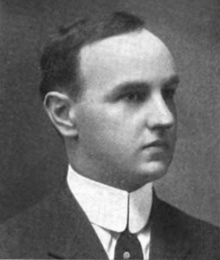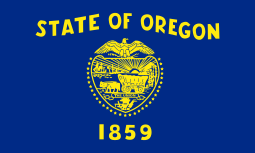Julius Meier
Julius L. Meier (December 31, 1874 – July 14, 1937)[1] was an American businessman, civic leader, and politician in the state of Oregon. The son of the Meier & Frank department store founder, he would become a lawyer before entering the family business in Portland. Politically an independent, Meier served a single term as the 20th Governor of Oregon from 1931–1935. He is the only independent to be elected Governor of Oregon.
Julius Meier | |
|---|---|
 Meier in 1911 | |
| 20th Governor of Oregon | |
| In office January 12, 1931 – January 14, 1935 | |
| Preceded by | A. W. Norblad |
| Succeeded by | Charles H. Martin |
| Personal details | |
| Born | December 31, 1874 Portland, Oregon |
| Died | July 14, 1937 (aged 62) Corbett, Oregon |
| Political party | Independent |
| Spouse(s) | Grace Mayer |
| Alma mater | University of Oregon School of Law |
| Profession | Merchant |
Early life
Meier was born in Portland to German immigrants of Jewish ancestry: Aaron, a merchant and founder of Oregon's largest department store, Meier & Frank, and Jeannette (Hirsch) Meier. He had three siblings, and was the father of Jean Ellen Meier Ehrman Reichert, Elsa Frances Meier Ganz, and Julius L. (Jack) Meier, Jr.[2] He married Grace Mayer on Christmas Day, 1901, saying afterwards that it was the only day that he was allowed off from the store.[2]
Meier graduated from the University of Oregon School of Law in 1895 and practiced law with a partner, George W. Joseph for the next four years, until he went into the family's business.[2] According to family tradition, it was at this time that he added the "L" to his name; the sign painter, who was putting his name on the door, insisted that all lawyers of substance had one and Meier suggested an "L".
Political career
Meier devoted 30 years to civic involvement before entering elective politics. A noted philanthropist, he also kept a high profile leading many good causes. During World War I, he headed Liberty Loan drives, served as regional director of the Council of National Defense, and after the war aided in the rehabilitation of France. He also headed the Oregon Commission of the 1915 Panama–Pacific International Exposition in San Francisco, and in 1922 attempted to bring a world's fair to Portland in 1925.
An important accomplishment was his leading the Columbia River Highway Association, the citizen committee creating political support for building the Columbia River Highway, first west from Portland to Astoria (1912–1915) and later east from Portland to The Dalles (1913–1922). His daughter, Jean, would later recall that he walked or crawled every inch of the highway's projected roadway.
In the 1930 gubernatorial election, George W. Joseph—who had been disbarred during an extensive dispute with the Oregon Supreme Court over the will and estate of E. Henry Wemme—won the Republican nomination for Governor of Oregon, but died shortly after. When Meier declined the nomination, the Republican Party selected Phil Metschan, Jr., son of a former Oregon state treasurer, as a replacement nominee. In contrast to a core element of Joseph's platform, Metschan opposed public development of hydroelectric power along the Columbia River.[2]
While he had been reticent due to his wealth and religion, Meier agreed to enter the race as an independent candidate, adopting Joseph's platform. In spite of opposition to his candidacy by The Oregonian (the state's largest newspaper),[3] he won 54.5 percent of the total vote, outdistancing his nearest competitor, Democratic candidate Edward F. Bailey, 135,608 votes to 62,434.[2][4] Meier's overwhelming victory was viewed as a reflection of strong public support for public hydropower development.[5]
Meier served for one term (1931–1935), declining to run for a second term for reasons of health.[1] He hired George W. Joseph Jr. as a legal adviser during the first legislative session of his administration, paying the younger Joseph's salary personally.[6] Among his accomplishments were establishing the Oregon Liquor Control Commission (after Prohibition ended), founding the Oregon State Police,[1] helping create a State Board of Agriculture and State Unemployment Commission, pressing for the adoption of a non-partisan judicial system, and using his business acumen to help the state navigate the financial tribulations of the Great Depression. Efforts to establish a sales tax and public power were not immediately successful,[7] though Federal legislation was passed in 1933 authorizing the public development of the Bonneville and Grand Coulee dams.
Later years
Time magazine reported in 1937 that Meier had sunk most of his fortune into what it called his "pet financial hobby", the American National Bank of Portland, which was closed in June 1933 and its assets and liabilities acquired by First National Bank.[8] After serving as governor he retired to "Menucha", his estate above the Columbia River in Corbett, Oregon, designed by architect Herman Brookman, where he died in 1937.[9] He is buried at Beth Israel Cemetery in Portland.
Julius Meier's official portrait escaped the fire which damaged the state capitol in 1935, as his successor Charles H. Martin had not allowed it to be displayed, and transferred it instead to Meier & Frank, from whose vaults it was recovered by the Oregon Secretary of State 50 years later. Another version of the story holds that the architect of the 1938 capitol did not want portraits hanging on the marble walls, and banished Meier's to the "Store".
His family sold Menucha in 1950 to the First Presbyterian Church of Portland, which now operates it as a conference and retreat center.[10] The Meier and Frank families sold the department store chain to the May Company in 1966. With May's sale to Federated in 2005, the remaining stores were rebranded as "Macy's" stores in September 2006.
See also
- Independent (politician)#Governor
References
- Mahoney, Barbara. "Julius L. Meier (1874-1937)". The Oregon Encyclopedia.
- Official biography of Julius L. Meier Archived July 16, 2011, at the Wayback Machine at Oregon State Library website
- "The Press: Snap the Whip". Time magazine. January 23, 1950.
- "Oregon's Governor-elect carries on for dead friend". The Washington Post. November 30, 1930.
- Schmidt, Emerson P. (February 1931). "The Movement for Public Ownership of Power in Oregon". The Journal of Land & Public Utility Economics. 7 (1): 57. JSTOR 3138633.
- "Geo. Joseph Jr. to advise Meier". Oregon Journal. January 14, 1931.
- Wharton, Wallace S. (August 13, 1933). "Oregon foresees lively primary". The New York Times.
- "Business: Portland Participation". Time magazine. April 19, 1937.
- "Ex-Gov. J. L. Meier of Oregon was 62". The New York Times. July 15, 1937.
- McCall, Merritt. "Menucha Retreat and Conference Center". The Oregon Encyclopedia.
External links
| Political offices | ||
|---|---|---|
| Preceded by A. W. Norblad |
Governor of Oregon 1931–1935 |
Succeeded by Charles H. Martin |
